In the digital area, your choice of a B2B E-commerce platform can be the key to your enterprise’s success. It’s all about making a strategic decision that improves efficiency. In B2B transactions, the platform you choose is essential for streamlining operations. The higher the level of competition, the higher to increase customer experiences and ensure long-term growth.
In this blog, we’ll discuss some insights you need when choosing a B2B E-commerce platform. So, let’s widen your perspective on the B2B E-commerce aspect and empower your business. It’s time to transform your business and seize the opportunities of the digital age.
Why Choose a B2B E-commerce Platform
B2B E-commerce platforms are custom-built online solutions crafted to meet the distinctive requirements of B2B enterprises. They cater to complex pricing, extensive product catalogs, and seamless integration needs.
Choosing a B2B E-commerce platform can significantly enhance your company’s efficiency, productivity, and customer reach. Firstly, it streamlines operations by offering bulk ordering, personalized catalogs, and tiered pricing, enhancing the customer experience and lightening your administrative load.
Secondly, these platforms expand your market presence globally, unlocking higher sales potential and deeper market penetration. Online convenience and self-service options also attract and retain customers, all of which fortify your business’s adaptability in the evolving digital B2B landscape.
Opting for a B2B E-commerce platform empowers your business with efficiency-boosting features and a broader customer reach, essential for thriving in today’s competitive B2B environment.
How To Choose A B2B E-commerce Platform

B2B E-commerce platforms provide many benefits for businesses that want to sell online. By allowing businesses to manage their inventory, customers, and orders in one place, B2B E-commerce platforms can save businesses time and money. In addition, B2B E-commerce platforms can provide businesses with the ability to reach a wider audience of potential customers.
To choose a B2B E-commerce platform, it is important to consider the following tips:
1. Decide On Your Budget
One of the foundational steps in selecting a B2B E-commerce platform is defining your budget. Assess your financial resources and determine how much you can allocate to the platform. Establishing a clear budget helps you avoid overspending and narrows down your options.
Keep in mind that the costs of implementing and maintaining the platform extend beyond the initial purchase, including hosting fees, maintenance, and potential development costs. Be realistic about your budget, ensuring it aligns with your overall business financial strategy.
2. Consider Your Business Needs
Understanding your business needs is paramount. Analyze your specific requirements, such as the volume of products you handle, the complexity of your pricing structures, and your need for integration with existing systems.
Your chosen platform should address these unique demands effectively. For instance, if your business relies heavily on personalized catalogs or requires sophisticated inventory management, seek platforms that excel in these areas.
Taking a close look at your business needs early in the process is vital to finding a truly compatible platform.
3. Research Different Platforms

The next step is to research the available B2B E-commerce platforms. There are numerous options on the market, each with its own set of features, pricing models, and scalability. Begin by creating a list of potential platforms and then delve into in-depth research. Investigate their core functionalities, customization options, and integration capabilities.
Read user reviews and case studies to gain insights into how well these platforms perform in real-world scenarios. Consider their compatibility with your industry, as some platforms are specialized for specific sectors. This research phase is critical in ensuring you select a platform that aligns with your business needs and goals.
4. Business Goals and Objectives

Before making your final choice, it’s crucial to align the platform with your business goals and objectives. Consider whether the platform can support your strategic aims, such as expanding into new markets, reaching a wider customer base, or boosting revenue.
The chosen platform should serve as a tool to help you achieve these objectives effectively. Make sure it has the necessary features and capabilities to support your long-term vision.
5. Security and Compliance
Security is a top priority in E-commerce, especially in a B2B context where sensitive data is involved. Assess the security features of the platform, including data encryption, payment processing security, and compliance with industry regulations such as GDPR or HIPAA if relevant to your business. Robust security measures not only protect your business and customer data but also build trust with your clients.
6. User-Friendliness

The user-friendliness of the platform is crucial for both your team and customers. An intuitive and easy-to-navigate interface enhances productivity and customer satisfaction. Look for a platform that offers a seamless and user-friendly experience. Ensure it’s responsive and accessible for mobile users, given the increasing trend of mobile shopping.
7. Customer Support and Training
Investigate the level of customer support and training offered by the platform provider. Reliable and responsive customer support can be invaluable when you encounter issues or need assistance.
Additionally, access to resources like tutorials, documentation, or training sessions is essential for you and your team to make the most of the platform’s capabilities. A supportive provider ensures a smoother overall experience with the platform.
8. Scalability and Flexibility

Scalability is a vital factor in the longevity of your chosen platform. Assess the platform’s ability to grow with your business and adapt to changing needs. Consider finding a solution that allows you to add new features, integrate with other systems, and expand your product offerings as your business evolves.
The flexibility of the platform is key in ensuring it remains a viable choice as your business grows and changes.
9. Performance and Speed
The performance and page loading speed of your chosen B2B E-commerce platform can significantly impact the user experience. Slow-loading pages can deter customers and affect your search engine rankings. It’s essential to choose a platform that delivers optimal performance, ensuring fast and responsive interactions for your customers.
10. Analytics and Reporting
Access to data-driven insights is invaluable in making informed decisions and optimizing your online sales strategies. Evaluate the platform’s built-in analytics and reporting tools.
What is more, looking for features that provide data on customer behavior, sales trends, and inventory management. A platform with robust analytics capabilities can help you fine-tune your business strategies and improve your overall performance.
11. Multi-language and Multi-currency Support

If you have international ambitions, make sure the platform supports multiple languages and currencies. This facilitates a seamless global customer experience and allows you to expand into different markets without technological constraints. Multi-language and multi-currency support can be essential for businesses looking to go global.
12. Ask For Recommendations
Seeking recommendations from industry peers, colleagues, or other businesses in your network is a wise step. Real-world feedback from those who have experience with specific B2B eCommerce platforms can provide valuable insights.
People who are profounded in the B2B E-commerce field can share their experiences, both positive and negative, and help you make an informed decision based on practical knowledge. Recommendations can often lead to discovering platforms that you might not have considered initially, saving you time and effort in your selection process.
What Are The Most Important Features Of An B2B E-commerce Platform?

Selecting the right e-commerce platform is a pivotal decision that can have a profound impact on your business’s success. As B2B transactions become increasingly complex, the choice of a platform plays a central role in streamlining operations, enhancing customer experiences, and achieving sustainable growth.
This section delves into the most critical factors to consider when evaluating a B2B E-commerce platform. Understanding and prioritizing these factors is the first step in making an informed decision that aligns with your business goals and sets the stage for a thriving online presence.
1. Scalability
Scalability is paramount for a B2B E-commerce platform. Your business is likely to grow and evolve, and your platform should be able to keep up.
A scalable platform allows you to adapt to changing demands, whether it’s accommodating a growing product catalog, increasing order volume, or expanding into new markets. This flexibility ensures your platform remains a valuable long-term investment, capable of supporting your business’s future success.
2. Security and Data Protection Regulations

Security is a critical concern in B2B E-commerce, where sensitive data is exchanged. Compliance with data protection regulations, such as GDPR or industry-specific standards like HIPAA, is non-negotiable.
A secure platform should feature robust data encryption, secure payment processing, and comprehensive measures to safeguard both your business and customer data. It’s essential to ensure that the platform adheres to these standards to maintain trust and protect sensitive information.
3. Integrations
The ability to integrate with other business systems and tools is crucial. Your B2B E-commerce platform should seamlessly work with your existing CRM, ERP, inventory management, and other essential software.
This integration streamlines operations, enhances data accuracy, and simplifies processes. It enables real-time data exchange, helping you make informed decisions and boosting overall efficiency in your business operations.
4. Cloud-Based or On-Premises Deployment

Choosing between a cloud-based or on-premises deployment is a significant decision. Cloud-based solutions offer flexibility, scalability, and reduced infrastructure management overhead. They also provide accessibility from anywhere with an internet connection.
On-premises solutions, on the other hand, offer more control over your environment but may require more extensive IT resources and maintenance. The choice depends on your specific business requirements, budget, and IT capabilities.
5. Open Source or Pre-Packaged Solutions
Open-source solutions offer extensive customization options and are often more budget-friendly. However, they may require more development and maintenance resources. Pre-packaged solutions, while faster to implement, may have limitations in customization. Your choice depends on the level of control and customization your business requires and the resources you have available.
6. Comprehensive Purchase Cycle Support

Your B2B E-commerce platform should support the entire purchase cycle. This includes features like personalized catalogs, tiered pricing, easy order management, and a seamless checkout process.
Moreover, it should cater to the complex and varied needs of B2B buyers, making their purchasing experience smooth and efficient. Comprehensive purchase cycle support enhances customer satisfaction and encourages repeat business.
7. Robust Customer Service and Technical Assistance
A reliable B2B E-commerce platform should offer robust customer service and technical assistance. When issues arise, having responsive and knowledgeable support is essential for troubleshooting and resolving problems. Access to training resources and documentation can empower your team to make the most of the platform’s capabilities. Strong customer service ensures a smoother overall experience.
8. Transparent Pricing Models

Transparent pricing models are crucial for budgeting and long-term planning. You should be able to clearly understand the costs involved, including initial setup, ongoing maintenance, and any potential transaction fees.
This transparency helps you make an informed decision based on your budget and growth expectations. A platform with straightforward pricing models reduces the risk of unexpected costs down the line.
Top 6 Best B2B E-commerce Platforms
In our comprehensive guide on how to choose a B2B E-commerce platform, we’ve put up a list of the 6 best B2B E-commerce platforms for your reference. Let’s find out what are the advantages of each and decide which is the best suit for your online business.
1. Adobe Commerce
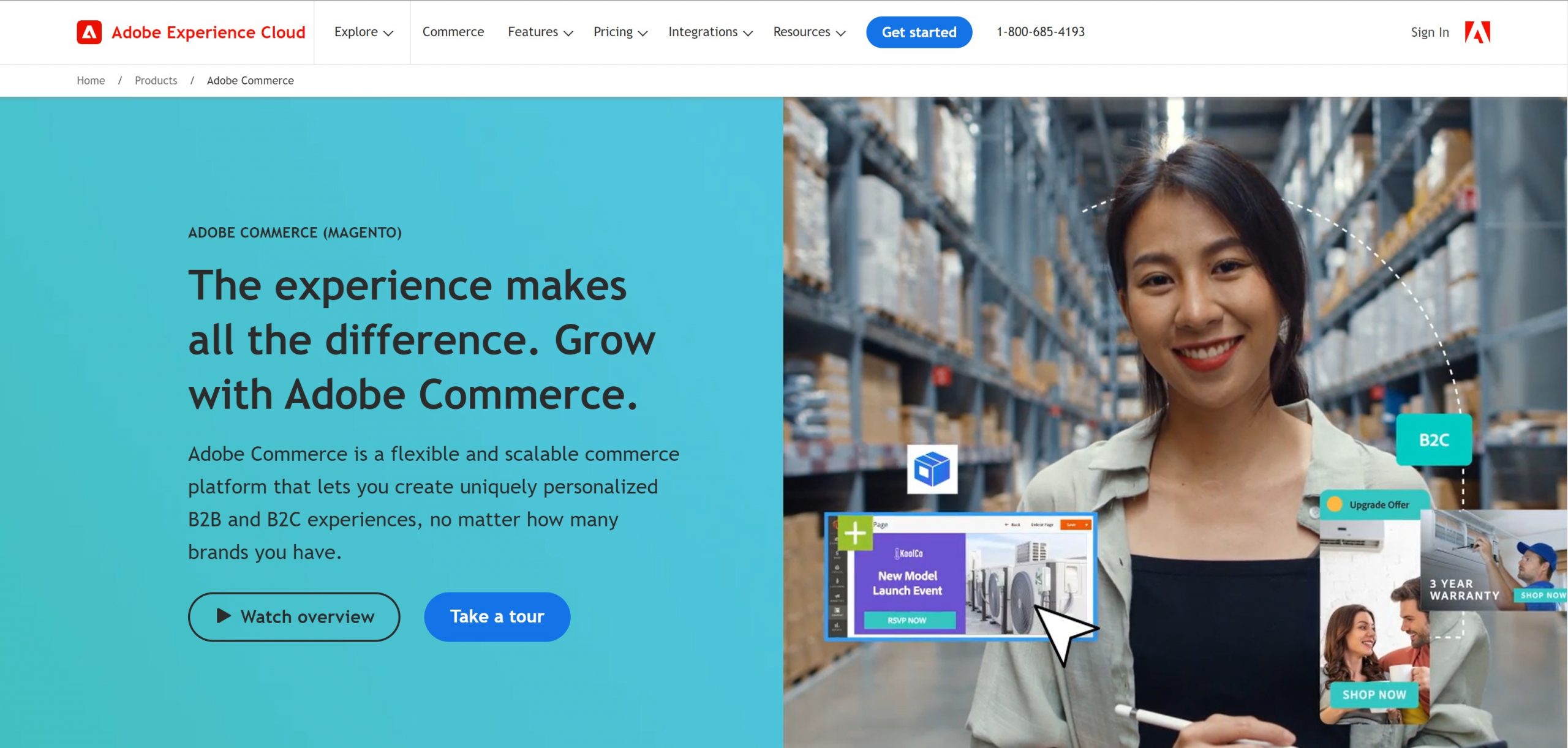
Magento is a leading E-commerce platform that was acquired by Adobe in 2018. It is now known as Adobe Commerce. Adobe Commerce is used by over 150,000 online stores worldwide, including some of the biggest brands in the world, such as Nike, Samsung, and Coca-Cola.
Adobe Commerce offers a wide range of features to help businesses create and manage a successful online store. Some of the key features include:
- Powerful product management: Adobe Commerce offers a powerful product management system that allows businesses to easily add, edit, and manage their products.
- Flexible checkout process: Adobe Commerce offers a flexible checkout process that allows businesses to customize the checkout experience for their customers.
- Robust security features: Adobe Commerce offers a variety of robust security features to protect businesses and their customers from fraud and cyber attacks.
- Scalability: Adobe Commerce is a scalable platform that can grow with businesses of all sizes.
- Customization options: Adobe Commerce is a highly customizable platform that allows businesses to create a unique and personalized online shopping experience for their customers.
2. Shopify Plus
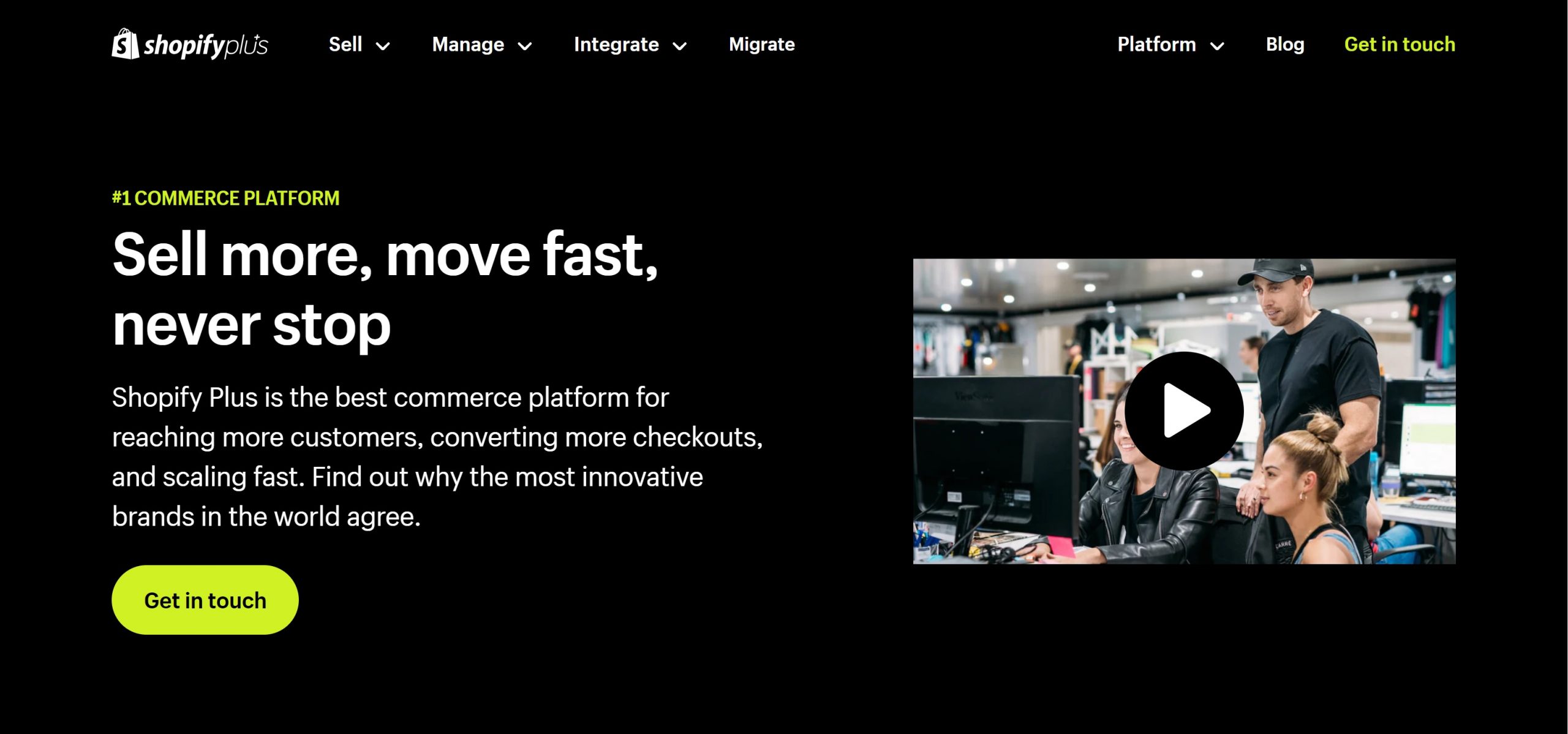
Shopify Plus is Shopify’s enterprise-grade eCommerce platform. It is designed for high-growth businesses that need a platform that can scale with them. Shopify Plus is used by some of the world’s leading brands, such as Allbirds, Gymshark, and Unilever.
Shopify Plus offers a wide range of features to help businesses create and manage a successful online store. Some of the key features include:
- Scalability: Shopify Plus is a highly scalable platform that can handle high traffic and transaction volumes.
- Security: Shopify Plus offers a variety of robust security features to protect businesses and their customers from fraud.
- Customization: Shopify Plus is a highly customizable platform that allows businesses to create a unique and personalized online shopping experience for their customers.
- Advanced features: Shopify Plus offers a variety of advanced features, such as unlimited staff accounts, custom storefronts, and advanced reporting.
3. BigCommerce
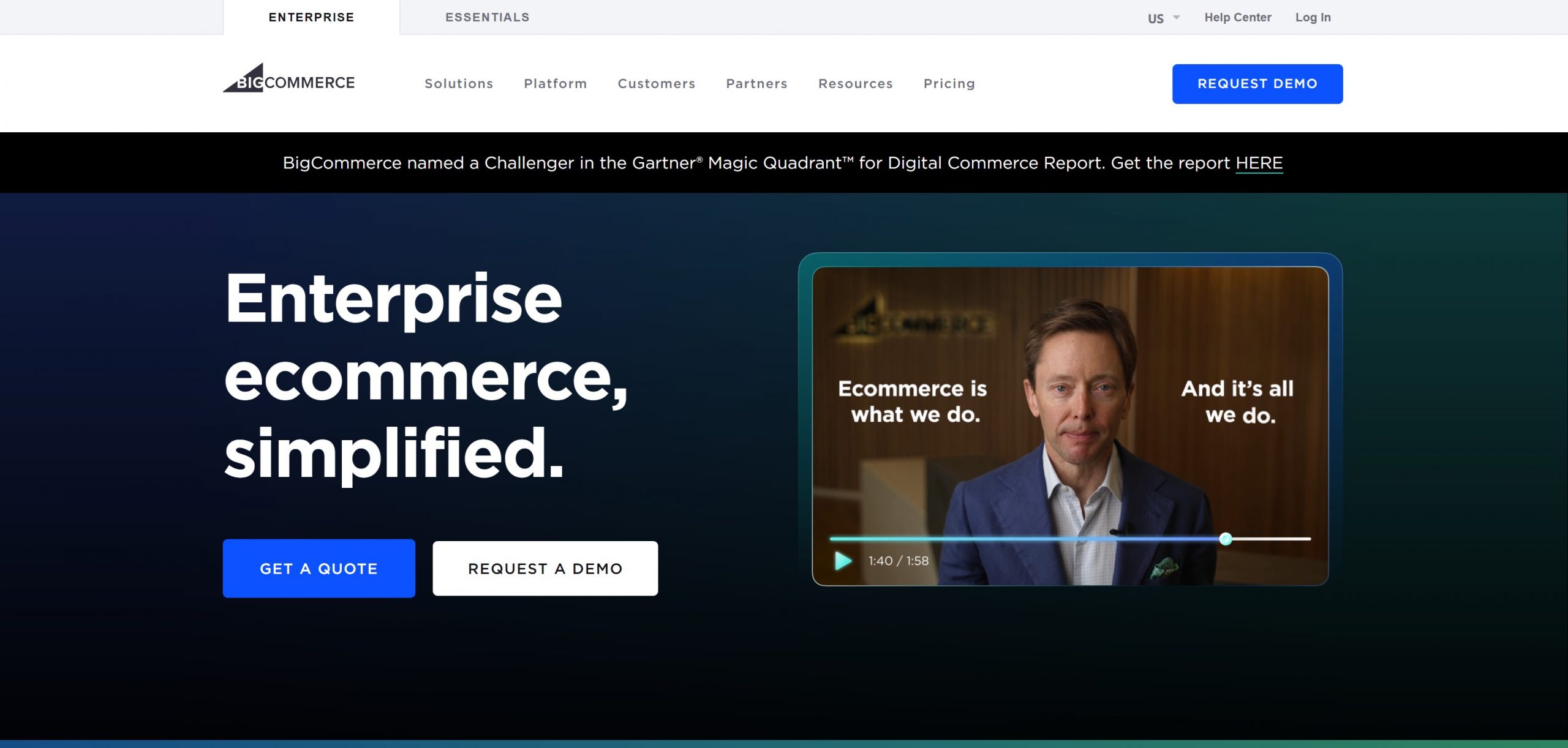
BigCommerce is a leading cloud-based eCommerce platform that allows businesses of all sizes to create and manage their online stores. It is used by over 62,229 businesses worldwide, including some of the biggest brands in the world, such as Skullcandy, Ben & Jerry’s, and Toyota.
BigCommerce offers a wide range of features to help businesses create and manage a successful online store. Some of the key features include:
- Easy-to-use platform: BigCommerce is a user-friendly platform that makes it easy for businesses to create and manage their online stores, even if they have no coding experience.
- Wide range of templates and themes: BigCommerce offers a wide range of templates and themes businesses can use to create a unique and personalized online shopping experience for their customers.
- Robust product management system: BigCommerce offers a robust product management system that allows businesses to easily add, edit, and manage their products.
- Secure checkout process: BigCommerce offers a secure checkout process that protects businesses and their customers from fraud.
- Scalability: BigCommerce is a scalable platform that can grow with businesses of all sizes.
4. NetSuite B2B E-commerce
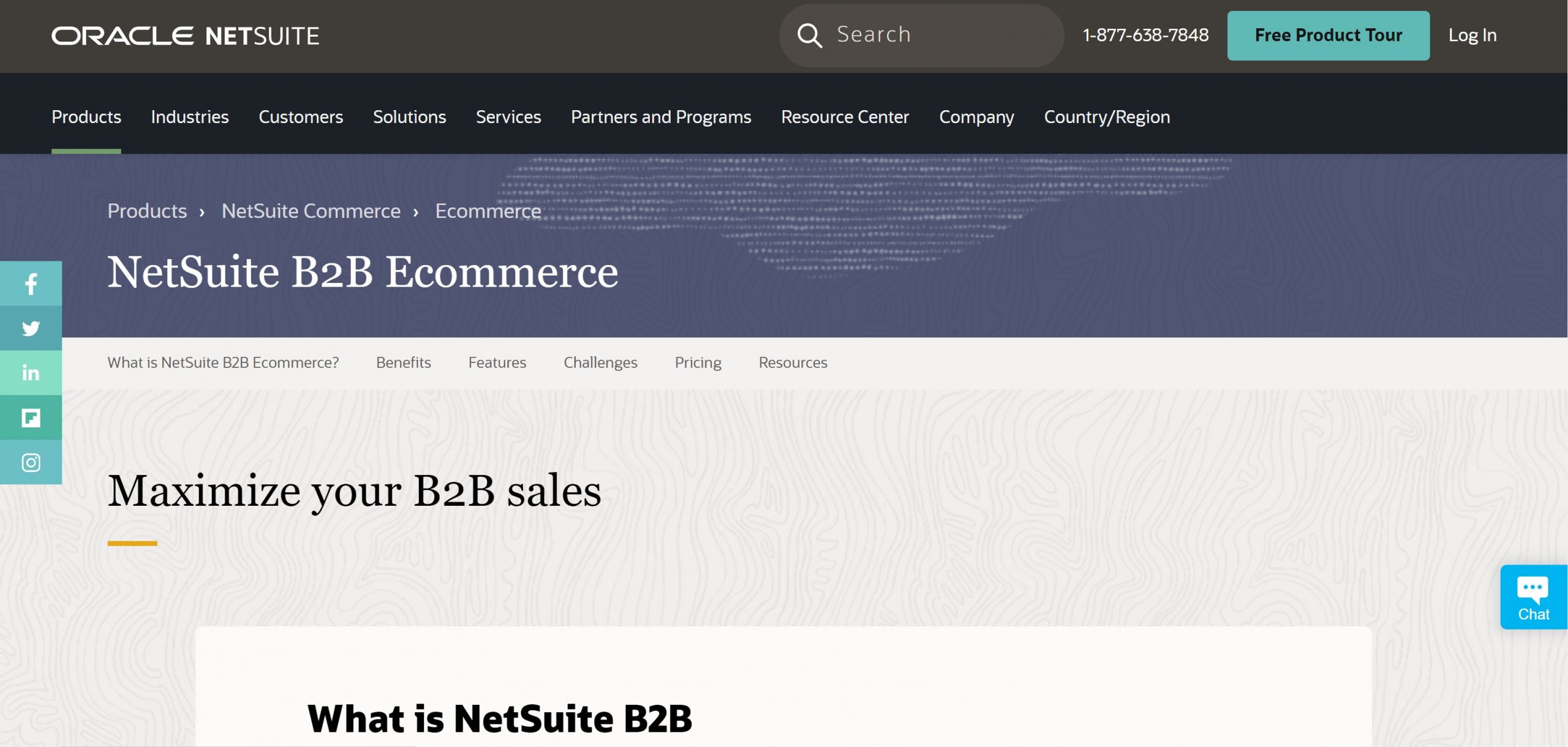
NetSuite B2B Commerce is a cloud-based eCommerce platform that is designed specifically for B2B businesses. It is part of the NetSuite suite of cloud-based business software applications, which includes ERP, CRM, and accounting solutions.
NetSuite B2B Commerce offers a wide range of features to help businesses create and manage a successful online store. Some of the key features include:
- B2B-specific features: NetSuite B2B Commerce offers a variety of features that are specifically designed for B2B businesses, such as customer-specific pricing, volume discounts, and negotiated contracts.
- Scalability: NetSuite B2B Commerce is a scalable platform that can grow with businesses of all sizes.
- Security: NetSuite B2B Commerce offers a variety of robust security features to protect businesses and their customers from fraud and cyber attacks.
- Integration: NetSuite B2B Commerce integrates seamlessly with other NetSuite products, as well as with a variety of third-party applications.
- Customization: NetSuite B2B Commerce is a highly customizable platform that allows businesses to create a unique and personalized online shopping experience for their customers.
5. WooCommerce
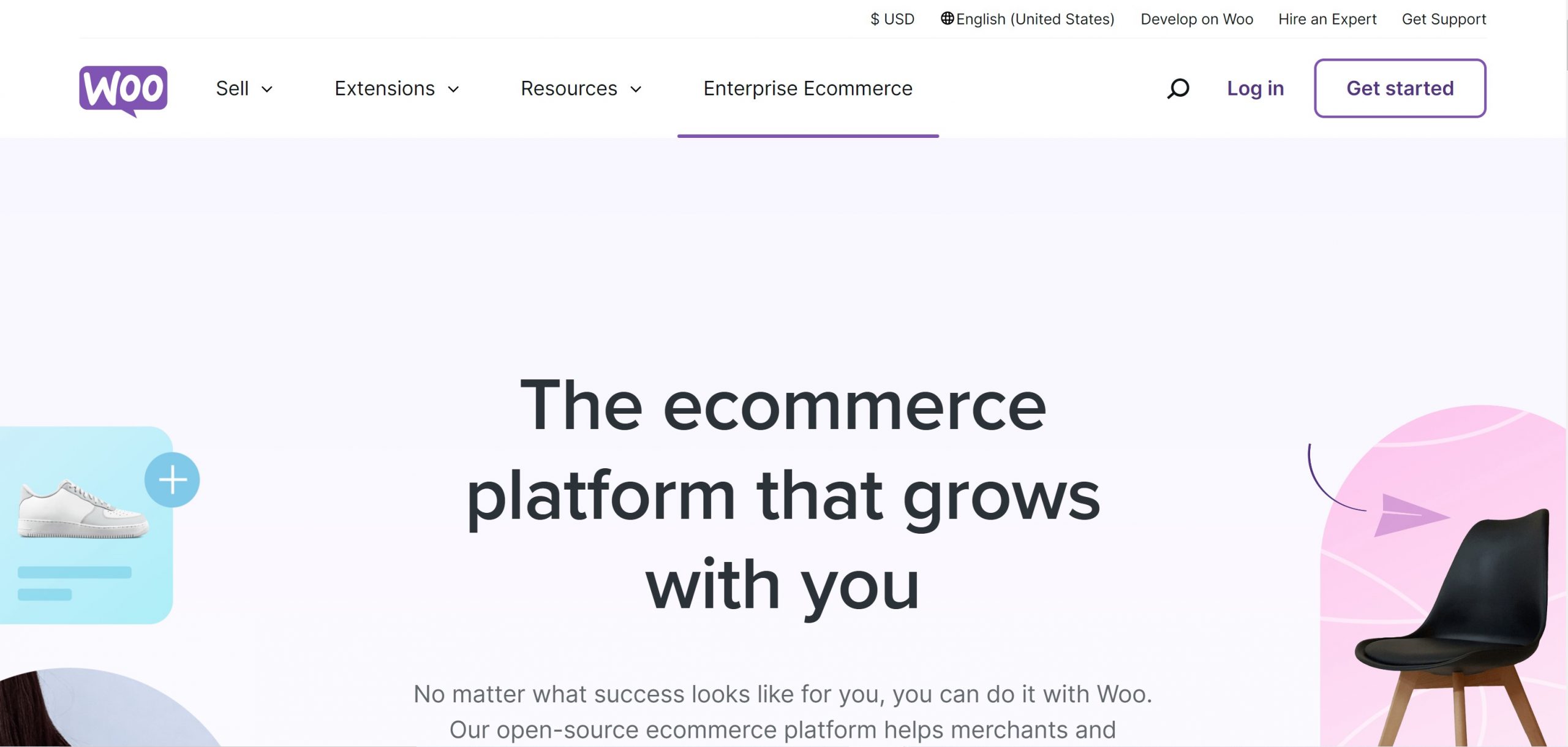
WooCommerce is an open-source eCommerce plugin for WordPress. Followed by Statista, when it comes to the leading E-commerce software platforms worldwide in July 2023, WooCommerce holds 38,74%. WooCommerce is used by businesses of all sizes, from small businesses to Fortune 500 companies.
WooCommerce offers a wide range of features to help businesses create and manage a successful online store. Some of the key features include:
- Product management: WooCommerce allows businesses to easily add, edit, and manage their products.
- Payment processing: WooCommerce integrates with a variety of payment processors, making it easy for businesses to accept payments from their customers.
- Shipping integration: WooCommerce integrates with a variety of shipping carriers, making it easy for businesses to ship their products to customers all over the world.
- Tax calculation: WooCommerce automatically calculates taxes for businesses based on their location and customers’ location.
- Security: WooCommerce is a secure platform that protects businesses and their customers from fraud.
6. OpenCart
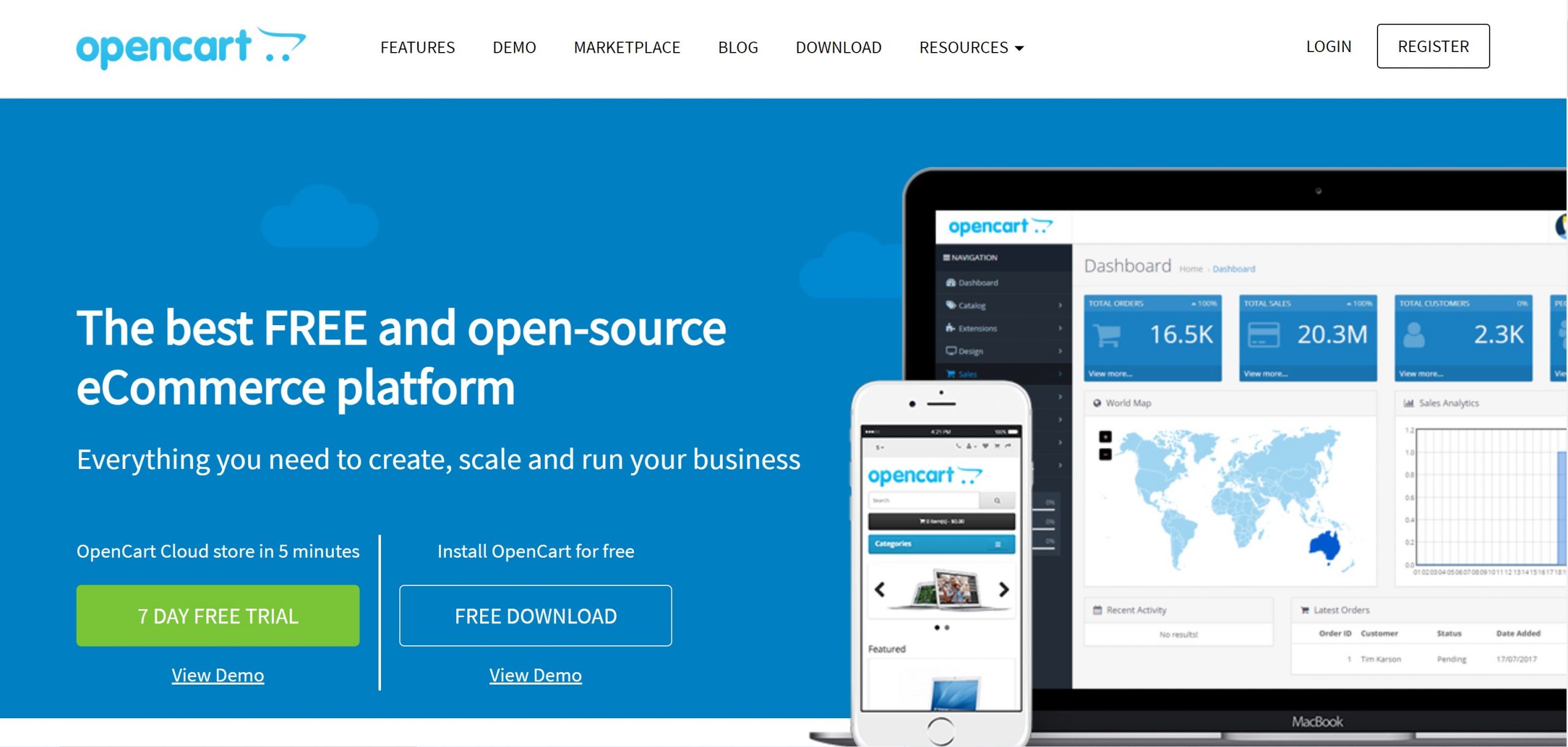
OpenCart is an open-source eCommerce platform that was first released in 2009. It has since become one of the most popular eCommerce platforms in the world, OpenCart has a market share of about 1.4%. OpenCart is known for being easy to use and customize, making it a good choice for businesses of all sizes.
OpenCart offers a wide range of features to help businesses create and manage a successful online store. Some of the key features include:
- Product management: OpenCart makes it easy for businesses to add, edit, and manage their products. Businesses can create unlimited product categories and subcategories, and they can add detailed product descriptions, images, and videos to their products.
- Payment processing: As mentioned above, OpenCart integrates with a variety of payment processors, making it easy for businesses to accept payments from their customers. Businesses can choose the payment processor that best suits their needs and the needs of their customers.
- Shipping integration: OpenCart also integrates with a variety of shipping carriers, making it easy for businesses to ship their products to customers all over the world. This means that businesses can offer their customers a variety of shipping options to choose from.
- Tax calculation: OpenCart can automatically calculate taxes for businesses based on their location and the location of their customers. This can save businesses a lot of time and hassle.
- Security: OpenCart is a secure platform that protects businesses and their customers from fraud. OpenCart uses a variety of security features, such as SSL encryption and fraud protection tools, to keep businesses and their customers safe.
Related Posts:

